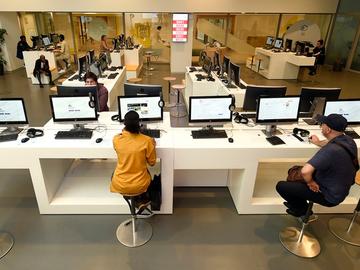The music sector became so severely infected by the coronavirus that it will be convalescing until at least the end of the summer. The question is whether it will have recovered sufficiently to be able to make something of the autumn, and whether we will ever be able to cast off the shackles of corona and go back to concerts. Fortuna- tely, there is tremendous resilience. “The possibilities are endless.”
"September is going to be an extremely busy month,” David Méndez Yépez of the Brussels latino pop band Chicos y Mendez recently told us. His concert at the Ancienne Belgique has been postponed until after the summer, he said with a hopeful but also uncertain look in his eye. While the rest of the country can gradually release itself from the grip of corona, the music sector, which since the collapse of record sales has made the majority of its income from the live circuit, continues to be in a deep coma. And will remain so until at least 31 August, as the National Security Council decided on 15 April.
But what about afterwards? Will the innumerable concerts that have been postponed to the autumn be able to take place, and if so, under what conditions? Has corona heralded the extinction of the moshpit? Will local artists be the only ones to get work? And will audiences still want to stand rows deep in Brussels’s concert halls? Or will we have to make do with live stream festivals, drive-in shows, and concerts in games?
“The possibilities are endless,” Coralie Berael combatively looks ahead. Berael is the venue manager of Vorst Nationaal/Forest National, which is part of the Sportpaleis Group, the Belgian operator that also runs the Sportpaleis in Antwerp and which has already had to reschedule at least 250 events. “We have to make sure that everything is manageable financially and that it is sustainable, and we have to continue to focus on the experience. But our biggest priority is that everything should be safe, both for the audience as well as for the artists and their entourages.”
Active consultations are currently ongoing in the sector to reach a consensus about what is manageable, Berael tells us. Advice is communicated to the GEES, the Belgian expert group that is supposed to lead us out of the lockdown. “Along with input from the government we will have to establish a protocol that is workable for everybody. The government must realize that we cannot simply start up again whenever the ‘go’ comes because organizing big concerts like ours takes time. Artists have to schedule shows in a tour that stops in several countries; it’s a giant puzzle.”
CORONA PASSPORTS
Over the past five years, the Sportpaleis Group has invested a lot in more efficient and safer organization, Berael explains. That includes cashless payments, e-tickets, and deals with the MIVB/STIB and the NMBS/SNCB. These measures may bear even more fruit than before. Concertgoers now also receive an informative email 48 hours in advance about mobility, safety, food and drinks, etc. “That system can be expanded, for example, through declarations that you are not sick and have not been in contact with people infected with corona, like with the GDPR norms. We could also introduce ‘corona passports’ for artists.”
These are admirable proposals, but the biggest problem remains the infection rate of corona and the social distancing required to stifle it. While cinemas, museums, and even theatres hope to reopen very soon with limited visitor capacity, it is much harder for clubs and concerts to conform to our new “one-and-a-half-metre” society.
“We organize concerts for 200 to 300 people,” says Tom Bonte, the soon to be departing director of the Beursschouwburg. “If social distancing continues to be enforced in the autumn, we will face an enormous problem. We will only be able to receive a maximum of thirty people, which is nowhere near enough for the experience we aim to provide. And of course, it is completely ruinous for our budget.”
Bigger venues do not necessarily have more room for manoeuvre, Marc Vrebos, interim director of the Ancienne Belgique, says. “We quickly realized that we cannot develop a coherent system that allows all our processes to run smoothly. This is related to the particularity of our specific operations, the building, the resulting audience flows, sanitary facilities, access control, cloakroom, etc., and of the capacity that you need to establish a break-even model. There will always be a problem somewhere.”
In order to guarantee social distancing, the AB would have to reduce the capacity of its large hall from 2,000 to 140. “From a financial and business perspective, that is not sustainable, especially if you want to keep all your staff aboard,” Vrebos tells us. Other than in the theatre sector, where subsidies are a significant part of the budget, most concert halls have to make the vast majority of their revenue from ticket sales, food and drinks sales, and hall rentals. “The bottom line is that our large hall is the engine of the AB. If that stalls, the whole organization stalls.”
Increasing ticket prices is not really an option. “They would have to become very expensive,” Vrebos explains. “It would entail ditching our participative policy. As a result, cultural institutions will become even more like white islands for the upper middle classes.” Reducing the artists’ pay, then? “Over the past few years, musicians have already taken a pay cut due to the collapse of record sales,” Bonte says. “They were able to compensate for that with live shows. But if they go too, they will not have any revenue sources left and they will have to start finding new jobs. It is up to the music sector to find an answer for that, however difficult it may be.”
Vrebos points to the danger of extreme creativity. “In Amsterdam, venues like Melkweg and Paradiso are thinking about introducing age limits because young people are not part of the high-risk group. That is segregation pure and simple. It terrifies me that cultural institutions are starting to think like that. What are venues like De Munt/La Monnaie supposed to do with their primarily older audiences who buy season tickets?”
FORTNITE
Berael hopes it will still be possible to organize concerts at Forest National if the hall capacity of 8,000 people is decimated. “We are thinking about ‘clusters’. Groups of people who live under the same roof can sit together without chairs in between. One-way traffic in the foyers, staggered arrival times, etc. are also things to be considered. Perhaps by then we will have developed a savoir-faire that gives us more options.”
Marianne Cattoir from the Brussels creative music PR agency Five Oh is also thinking along those lines. Five Oh promotes artists like Angèle, Roméo Elvis, and Juicy, as well as the Listen! Festival, which has likewise been postponed to the autumn. It normally hosts a Fifty Session every month, and the second edition of its showcase festival Fifty Lab is supposed to take place in November. “As soon as we can, we will organize something in the summer. Small scale, and with a focus on Belgian artists. Our primary purpose is to support our sector.”
In the Netherlands, up to thirty people will be permitted to congregate from 1 June, and on 1 July it may be up to one hundred. Will smaller players be given a boost? “It is difficult to say,” Cattoir says, “it all depends on regulations that will be imposed. There is a lot of fear among the bigger events, but the smaller-scale venues and events are very eager. We are, at least.”
With some new alternatives popping up, do they fear they will lose audiences? “We have often wondered, like after the introduction of streaming, for example, whether people would swap the live experience for something else,” Vrebos says. “But the intensity of a live concert cannot be duplicated.” The American rapper Travis Scott recently performed in the game Fortnite for 28 million gamers. “This might be a temporary alternative platform, but only for big names. Upcoming talent would not find opportunities in a medium like that. This automatically leads to an impoverishment of the artistic landscape.”
Nevertheless, it is not unthinkable that people aren’t champing at the bit to be crammed into a concert hall like sardines in a tin. “After the attack at the Bataclan in Paris, we saw a decrease of twenty percent in our visitor numbers,” Berael says. “After the attack in Brussels, it was ten percent, but after the suicide attack in Manchester at the Ariana Grande concert, there was no drop. People adapt quickly. We are currently conducting a survey from which it is apparent that people are eager to go to concerts again.” Vrebos is also convinced that this is true: “There is so much hunger for culture that people will come back quickly, as soon as it is safe to do so.” Cattoir thinks so, too, “but I don’t see a sold-out AB doing moshpits to a concert by Zwangere Guy.”
CIVIC RESPONSIBILITY
The future will bring music to our ears, but will the music sector ever be the same? “One of the biggest difficulties is the total uncertainty in which we now find ourselves, and whether there will be a second peak,” Bonte says. “That might be a fatal blow to many organizations. If we ever go back to normal, it will certainly be with a different feeling. We will probably retain some of the measures. A lot will depend on a sense of civic responsibility. But that is a very abstract concept. Just look at how we take on the climate crisis.” Berael likewise expects a lot from citizens. “As an individual, there was no way to guard yourself against the attacks, but with this virus, concertgoers will have to take their responsibility. Measure your temperature every morning, always carry a mouth mask, keep your distance… these are things we will have to get used to.”
If there’s one thing clear, it is that things won’t go back to normal until there is a vaccine. “In the meantime, we will have to make do with a solution that I haven’t found yet,” Bonte says. “Hopefully it will be more attractive than the drive-in festivals that are being organized this summer. That’s a gimmick, not a structural solution. You don’t want to eat hamburgers at a drive-in every day, do you? Sometimes you want to go to a good restaurant.”
Read more about: Brussel , Muziek , Brussel na corona , coronavirus , cultuurbeleid
_PhotoNews.jpg?style=W3sianBlZyI6eyJxdWFsaXR5Ijo3NX19LHsicmVzaXplIjp7ImZpdCI6ImNvdmVyIiwid2lkdGgiOjM2MCwiaGVpZ2h0IjoyNzAsImdyYXZpdHkiOiJjZW50ZXIiLCJ3aXRob3V0RW5sYXJnZW1lbnQiOnRydWV9fV0=&sign=0e0c2997c04bb09453fc8661114d6b70723d6ab46704a30f241511783113808c)


_PhotoNews.jpg?style=W3sianBlZyI6eyJxdWFsaXR5Ijo3NX19LHsicmVzaXplIjp7ImZpdCI6ImNvdmVyIiwid2lkdGgiOjM2MCwiaGVpZ2h0IjoyNzAsImdyYXZpdHkiOiJjZW50ZXIiLCJ3aXRob3V0RW5sYXJnZW1lbnQiOnRydWV9fV0=&sign=328d08970f0263af197a9a622fd0a1395be546b6e1c2c94ae5861f72e6f9115f)
Fijn dat je wil reageren. Wie reageert, gaat akkoord met onze huisregels. Hoe reageren via Disqus? Een woordje uitleg.